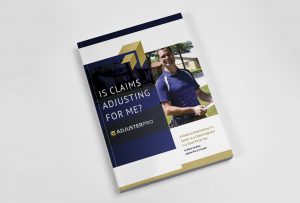For those absolutely new to the claims adjusting business, this recently updated article provides a basic profile of claims adjusting as a career.
Who are adjusters?
Almost anyone can become an insurance adjuster. No college degree is required for most independent adjusters but you do need to be 18 years old. While some adjusters have started out in the claims industry, many folks begin their insurance claims career after work in other fields. Common backgrounds include construction, contracting, insurance sales, insurance underwriting, appraisals, and property inspections. However, teachers, farmers, attorneys, truckers, plumbers, dog whisperers, HVAC specialists, and entrepreneurs (to name but a few) have all transitioned smoothly into the world of insurance claims adjusting.
What do insurance adjusters do?
Insurance claims adjusters inspect claims of damage or loss, interpret and apply the customer’s insurance policy, negotiate the settlement, and may authorize payments to the claimant.
Why are insurance adjusters needed?
Insurance adjusters are needed because settling insurance claims ultimately requires human judgment. Every claim is unique, so call-in centers with computers can only take insurance companies so far. Field adjusters are relied upon to inspect and interpret the particular demands of each claim. It is reassuring to know that insurance adjusters will always be needed. Outsourcing to technology can decrease the workload for adjusters, but will never eliminate the need for adjusters themselves.
The need for adjusters is never higher than when catastrophe strikes. In the wake of Hurricanes Katrina, Wilma, and Rita in 2005, insurance companies were desperate for licensed independent insurance adjusters. Even though most companies staff a contingent of their own salaried “storm troopers” – these adjusters weren’t able to handle the massive volume of claims created just by Katrina. When the additional hurricanes made landfall, it seemed the requirement for getting hired as an independent adjuster dropped from having a license to simply having a car. Thousands of new and inexperienced “cat adjusters” cut their teeth during these trying times. Hurricanes Harvey, Irma, and Maria created a similar situation in 2017. While this level of catastrophic damage is thankfully rare, events like these create an all-out bidding war for licensed adjusters as companies compete to get people working for them instead of their competitor.
But it’s important to remember that adjusters are needed all over the country, every day of the year, not just during hurricanes. From car wrecks to burst pipes, from broken windows to kitchen fires, from floods to hail storms, ice storms, tornados, wind, snow, and even heat waves…they all create a demand for adjusters.
What types of adjusters are there?
- Independent Adjuster. Independent adjusters are independent contractors who will generally work wherever mother nature has wrought violence. Where an adjuster lives may have no bearing upon where he or she works. An independent adjuster residing in Minnesota may contract with an adjusting firm in Iowa and be sent to work hurricane claims in Florida! An independent claims adjuster should be prepared for extensive travel. These folks may be sent to a certain location for a few weeks to handle a hail storm or deployed for months after a major catastrophe.
- Staff Adjuster. Staff adjusters typically work a limited geographical region in their vicinity. While extensive travel is possible, the range and frequency of travel is much less than for the average independent adjuster. Operating this way may be more suitable for those where family demands are prohibitive to extensive time away from home.
When do Insurance Adjusters work?
- Independent Adjuster. Independent adjusters will work as long as the job requires. A hail storm may require only 3 weeks of claims adjusting while a category 4 hurricane will put some independent adjusters to work for over a year. The intensity and scope of damage determine the number of claims filed which greatly affects the time allotted for settling each claim. It is common for independent adjusters to go without work for months at a time. However, compensation for “cat adjusting” is excellent, and prudent independent claims adjusters should be able to survive the lean times.
- Staff Adjuster. Staff adjusters will generally have a far more consistent schedule than an independent adjuster. As a salaried employee, staff adjusters will work year round as with most other types of jobs. The security and consistency of cash flow make staff adjusting the more appealing option for some adjusters.
Being an insurance adjuster is a challenging but rewarding and lucrative career. If you’re interested in the field and want to learn more, Co-Founder Adam Gardiner wrote a great ebook about his experience and what it takes to break into and make it in the industry.
If you have questions or want to know more…give us a call. We are here to help.




